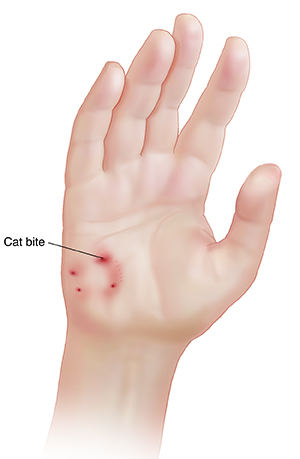A cat bite can cause a wound deep enough to break the skin. In such cases, the wound needs to be cleaned and sometimes closed with stitches (sutures). If a health care provider closes the wound, they don't usually close it completely. This is so that fluid can drain if the wound becomes infected. Often the wound is left open to heal. In addition to wound care, a tetanus shot may be given, if needed.
Home care
-
Wash your hands well with soap and clean, running water before and after caring for the wound. This helps lower the risk of infection.
-
Care for the wound as directed by your health care provider. If a dressing was applied to the wound, be sure to change it as directed.
-
If the wound bleeds, place a clean, soft cloth on the wound. Then firmly apply pressure until the bleeding stops. This may take up to 5 minutes. Don't release the pressure and look at the wound during this time.
-
Always get medical attention for cat bites on the hand. They're highly likely to become infected.
-
Most wounds heal within 10 days. An infection can occur even with correct treatment. So be sure to check the wound daily for signs of infection (see below).
-
Antibiotics may be prescribed to help prevent or treat the infection. If you’re given antibiotics, take them as directed. Also be sure to take all of the medicine.
Rabies prevention
Rabies is a virus that can be carried in certain animals. These can include domestic animals, such as cats and dogs. Pets fully vaccinated against rabies (2 shots) are at very low risk of infection. But because human rabies is almost always fatal, any biting pet should be confined for 10 days as an extra precaution. In general, if there's a risk for rabies, the following steps may need to be taken:
-
If someone’s pet cat has bitten you, it should be kept in a secure area for the next 10 days to watch for signs of illness. If the pet owner won’t allow this, contact your local animal control center. If the cat becomes ill or dies during that time, contact your local animal control center at once so the animal can be tested for rabies. If the cat stays healthy for the next 10 days, there's no danger of rabies in the animal or you.
-
If a stray cat has bitten you, contact your local animal control center. They can give information on capture, quarantine, and animal rabies testing.
-
If you can’t find the animal that bit you in the next 2 days, and if rabies exists in your area, you may need to receive the rabies vaccine series. Call your health care provider or go back to the emergency room right away.
-
All animal bites should be reported to the local animal control center. If you were not given a form to fill out, you can report it yourself.
Follow-up care
Follow up with your health care provider as directed.
When to get medical advice
Contact your health care provider right away if you have:
-
Signs of infection, such as:
-
Spreading redness or warmth from the wound.
-
Increased pain or swelling.
-
Fever of 100.4ºF (38ºC) or higher, or as directed by your provider.
-
Colored fluid or pus draining from the wound.
-
Enlarged lymph nodes above the area that was bitten, such as lymph nodes in the armpit if you were bitten on the hand or arm. This may be a sign of cat-scratch disease (cat-scratch fever).
-
-
Signs of rabies infection, such as:
-
Headache.
-
Confusion.
-
Strange behavior.
-
Increased salivating or drooling.
-
Seizure.
-
-
Decreased ability to move any body part near the bite area.
-
Bleeding that can't be stopped after 5 minutes of firm pressure.


